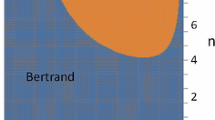Summary.
General equilibrium models of oligopolistic competition give rise to relative prices only without determining the price level. It is well known that the choice of a numéraire or, more generally, of a normalization rule converting relative prices into absolute prices entails drastic consequences for the resulting set of Nash equilibria when firms are assumed to maximize profits. This is due to the fact that changing the price normalization amounts to altering the objective functions of the firms. Clearly, the objective of a firm must not be based on price normalization rules void of any economic content. In this paper we propose a definition of the objective of a firm, called maximization of shareholders' real wealth, which takes shareholders' demand explicitly into account. This objective depends on relative prices only. Real wealth maxima are shown to exist under certain conditions. Moreover, we consider an oligopolistic market and prove the existence of a Nash equilibrium in which each firm maximizes the real wealth of its shareholders.
Similar content being viewed by others
Author information
Authors and Affiliations
Additional information
Received: July 10, 1997; revised version: July 27, 1998
Rights and permissions
About this article
Cite this article
Dierker, E., Grodal, B. The price normalization problem in imperfect competition and the objective of the firm. Economic Theory 14, 257–284 (1999). https://doi.org/10.1007/s001990050293
Issue Date:
DOI: https://doi.org/10.1007/s001990050293




